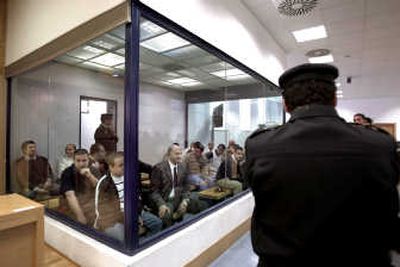Spanish court convicts 21 in 2004 Madrid bombings

MADRID, Spain – A Spanish court Wednesday convicted 21 men in the 2004 bombings of Madrid’s train system, the deadliest terror attack in continental Europe, but acquitted an Egyptian national whom authorities once touted as the mastermind.
Most of the 28 defendants, including two others originally accused of planning the bombings, were given sentences considerably lighter than those sought by prosecutors, thus angering survivors and families of the dead.
The mixed verdicts, contained in a 700-page ruling and announced in a heavily guarded courtroom on Madrid’s outskirts, cap a case that exposed the workings of Islamic terror networks in the heart of Europe and foreshadowed attacks in London and elsewhere.
A total of 191 people were killed and nearly 2,000 injured when explosives hidden in backpacks ripped through four commuter trains during morning rush hour on March 11, 2004.
The investigation eventually revealed a “franchise” of Islamic militants, inspired by al-Qaida but originating in the Maghreb region of northern Africa. They had lived and worked in Spain for years, sometimes on the crime-ridden fringes of society but more or less blending with the local community. They became actors in a new, more destructive kind of terrorism in a country long accustomed to the violence of Basque separatists.
Three defendants – two Moroccans and a Spaniard accused of supplying explosives – were convicted of mass murder and sentenced to tens of thousands of years in prison. Under Spanish law, however, each will serve no more than 40 years. Spain has neither a death penalty nor life imprisonment.
Eighteen other defendants were found guilty of lesser charges, including membership in a terrorist organization. The rest were acquitted.
When the acquittals were read, gasps filled the courthouse, packed with survivors, relatives and scores of journalists. Several relatives emerged weeping. They said they were furious and disappointed.
“I do not like that murderers are being let loose,” said Pilar Manjon, whose 20-year-old son was killed in the bomb blasts and who now leads a victims group.